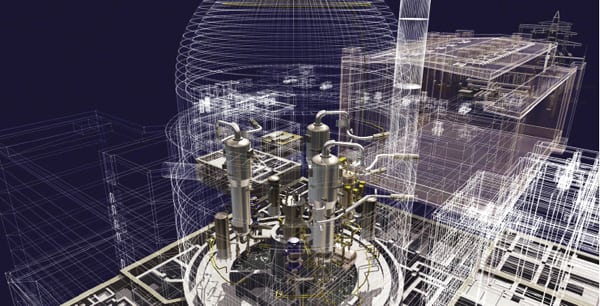Turkey Prepares to Host First ATMEA 1 Nuclear Reactors
An agreement signed by Turkish Prime Minister Recep Tayyip Erdogan and Japan’s Prime Minister Shinzo Abe this May could pave the way for the world’s first ATMEA 1 reactors to be built in Turkey in the 2020s. Construction of four reactors using the midsize nuclear reactor design developed through the collaboration of French nuclear firm AREVA and Japan’s Mitsubishi Heavy Industries (MHI) could cost as much as $21 billion, begin as early as 2017, and be completed by 2023.
The Gen-III+ pressurized water reactor (PWR) design developed by the Atmea French-Japanese joint venture that was established in 2007 has a capacity of 1,100 MWe (Figure 2). Developed to be marketed to countries embarking on new nuclear programs, the design has three active and passive redundant safety systems and an additional backup cooling chain, like AREVA’s EPR. It also has a 37% net thermal efficiency, 157 fuel assemblies, a 60-year life, and the capacity to use mixed-oxide fuel only. French nuclear regulator ASN approved the general design in February 2012.
 |
| 2. The first of its kind. An agreement between Japan and Turkey this May paves the way for the construction of four ATMEA 1 reactors in Turkey’s northern city of Sinop, on the Black Sea. ATMEA 1 is a midsize Generation III+ pressurized water reactor of 1,100 MWe net, developed by ATMEA, the Mitsubishi Heavy Industries and AREVA joint venture. Courtesy: ATMEA |
If the agreement proceeds, the proposed reactors could make up Turkey’s second nuclear power plant in the northern city of Sinop on the Black Sea. An international consortium of Japan’s MHI, Itochu Corp., French utility group GDF Suez, and the Turkish Electricity Generation Co. (EUAS) would further develop the project. ATMEA would provide the nuclear island for the plant construction contract.
Turkey imported much of its energy in 2012 at a cost of about $60 billion, and its future energy policy stresses energy efficiency and security. Development of nuclear power is expected to slash reliance on Russian and Iranian gas for power. But though a nuclear power program has been under development since the 1970s, plans to build the country’s first nuclear plant at Akkuyu, near the port of Mersin, were only made concrete in August 2009, when two agreements between Turkish Atomic Energy Authority (TAEK) and Russia’s Rosatom were inked for the construction of four 1,200-MWe AES-2006 units. That $25 billion project is expected to break ground this September, and the first unit could come online by 2019.
According to developers AREVA and MHI, the ATMEA 1 reactor design is under consideration in Jordan and Vietnam. Media reports suggest Jordan could soon decide which nuclear technology it will use to build two planned nuclear reactors, one expected to begin construction this year and be completed by 2020, and the other for operation by 2025. Along with the ATMEA 1 design, Jordan is evaluating AtomStroyExport’s AES-92 model VVER-1000.
—Sonal Patel is POWER’s senior writer.